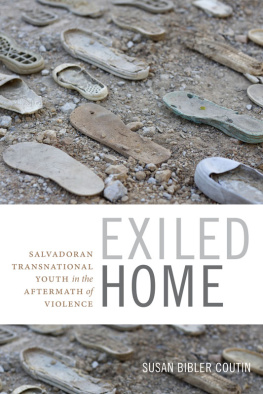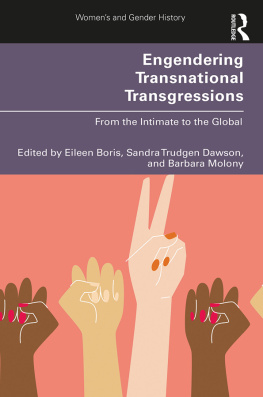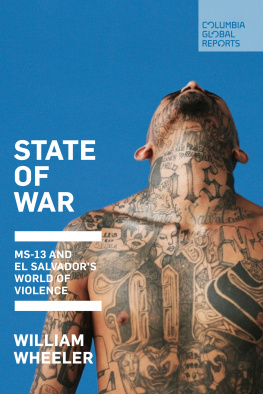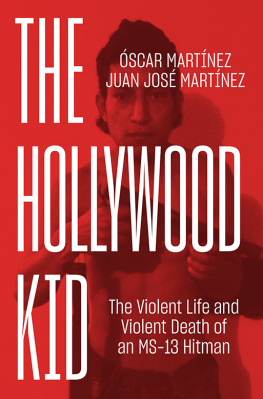Susan Bibler Coutin - Exiled Home: Salvadoran Transnational Youth in the Aftermath of Violence (Global Insecurities)
Here you can read online Susan Bibler Coutin - Exiled Home: Salvadoran Transnational Youth in the Aftermath of Violence (Global Insecurities) full text of the book (entire story) in english for free. Download pdf and epub, get meaning, cover and reviews about this ebook. year: 2016, publisher: Duke University Press, genre: Politics. Description of the work, (preface) as well as reviews are available. Best literature library LitArk.com created for fans of good reading and offers a wide selection of genres:
Romance novel
Science fiction
Adventure
Detective
Science
History
Home and family
Prose
Art
Politics
Computer
Non-fiction
Religion
Business
Children
Humor
Choose a favorite category and find really read worthwhile books. Enjoy immersion in the world of imagination, feel the emotions of the characters or learn something new for yourself, make an fascinating discovery.
- Book:Exiled Home: Salvadoran Transnational Youth in the Aftermath of Violence (Global Insecurities)
- Author:
- Publisher:Duke University Press
- Genre:
- Year:2016
- Rating:4 / 5
- Favourites:Add to favourites
- Your mark:
- 80
- 1
- 2
- 3
- 4
- 5
Exiled Home: Salvadoran Transnational Youth in the Aftermath of Violence (Global Insecurities): summary, description and annotation
We offer to read an annotation, description, summary or preface (depends on what the author of the book "Exiled Home: Salvadoran Transnational Youth in the Aftermath of Violence (Global Insecurities)" wrote himself). If you haven't found the necessary information about the book — write in the comments, we will try to find it.
Susan Bibler Coutin: author's other books
Who wrote Exiled Home: Salvadoran Transnational Youth in the Aftermath of Violence (Global Insecurities)? Find out the surname, the name of the author of the book and a list of all author's works by series.
Exiled Home: Salvadoran Transnational Youth in the Aftermath of Violence (Global Insecurities) — read online for free the complete book (whole text) full work
Below is the text of the book, divided by pages. System saving the place of the last page read, allows you to conveniently read the book "Exiled Home: Salvadoran Transnational Youth in the Aftermath of Violence (Global Insecurities)" online for free, without having to search again every time where you left off. Put a bookmark, and you can go to the page where you finished reading at any time.
Font size:
Interval:
Bookmark:
GLOBAL INSECURITIES
A series edited by Catherine Besteman and Daniel M. Goldstein

2016 Duke University Press
All rights reserved
Printed in the United States of America on acid-free paper
Typeset in Arno Pro by Graphic Composition, Inc.
Library of Congress Cataloging-in-Publication Data
Names: Coutin, Susan Bibler, author.
Title: Exiled home : Salvadoran transnational youth in the aftermath of violence / Susan Bibler Coutin.
Other titles: Global insecurities.
Description: Durham : Duke University Press, 2016.
Series: Global insecurities | Includes bibliographical references and index.
Identifiers: LCCN 2015040909|
ISBN 9780822361442 (hardcover : alk. paper) |
ISBN 9780822361633 (pbk. : alk. paper) |
ISBN 9780822374176 (e-book)
Subjects: LCSH: SalvadoransUnited States. | Salvadoran AmericansUnited States. | United StatesEmigration and immigration. | El SalvadorEmigration and immigration. | SalvadoransLegal status, laws, etc.United States. | RefugeesUnited States. | Unaccompanied immigrant childrenUnited States.
Classification: LCC E184.s15 c688 2016 | DDC
973/.004687284dc23
LC record available at http://lccn.loc.gov/2015040909
Cover art: Cementerio de zapatos, homenaje a Mons. Romero, de la serie Mis pies son mis alas, de Walterio Iraheta. (Cemetery of Shoes, an homage to Archbishop Romero, from the series My Feet Are My Wings, by Walterio Iraheta.)
to Casey
- CHAPTER 1
Violence and Silence - CHAPTER 2
Living in the Gap - CHAPTER 3
Dreams - CHAPTER 4
Exiled Home through Deportation - CHAPTER 5
Biographies and Nations - CONCLUSION
Re/membering Exiled Homes
My deepest debt of gratitude is to the many individuals who agreed to participate in interviews but who remain nameless here for reasons of confidentiality. I feel extremely privileged, inspired, and humbled to have had the opportunity to speak with all of you, to document some key moments in your lives, and to reflect with you on the significance of U.S. and Salvadoran immigration policies and histories. I have been changed as a result, and I now view the world differently. I hope that this book in some way does justice to the many accounts that were entrusted to me and that it serves to re/member.
I am also indebted to the many individuals and organizations that facilitated the research for this book by inviting me to events, referring me to others, allowing me to make announcements about the project, and brainstorming with me. I thank Henry Aguilar, Jesus Aguilar, Kay Andrade-Eekhoff, Tony Azcar, Beth Baker-Cristales, Norma Chinchilla, Grace Delgado, Ester Hernndez, Luis Perdomo, Alex Sanchez, Daniel Sharp, Samuel Uribe, and Kristine Zentgraf for their help. I am also grateful to the Central American Resource Center ( CARECEN ), Los Angeles; CARECEN Internacional in San Salvador; the Centro de Intercambio y Solidaridad, El Salvador; El Rescate, Los Angeles; and Homies Unidos, El Salvador, for their assistance. In particular, I could not have done interviews with individuals who had been deported to El Salvador were it not for the incredibly valuable assistance of Luis Perdomo, to whom I owe a tremendous debt. There are other individuals who also assisted but who are not named here for reasons of confidentiality: I am extremely grateful to you as well.
This material is based on work supported by the National Science Foundation under Grant No. # SES -0518011. Any opinions, findings, and conclusions or recommendations expressed in this material are those of the author and do not necessarily reflect the views of the National Science Foundation.
I thank William Flores for sharing his copy of the script to De la locura a la esperanza and for permission to reproduce his photo of actress Rocio Enriquez performing in the play; Carlos Henriquez Consalvi for permission to reproduce a photo from the collection held by the Museo de la Palabra y la Imagen; Beatriz Cortez for permission to reproduce one of the stills from Pasaje Los ngeles and for her corrections to my description of the commemoration of the 1992 peace accords; Maya Chinchilla for permission to reprint the poem Central American-American; and GusTavo Adolfo Guerra Vsquez for permission to reprint the poem hybrideities/hibrideidades.
I had the benefit of numerous graduate student research assistants, who lent their expertise to the project, including Joshua Clark, Katie Dingeman-Cerda, Vronique Fortin, Danny Gascon, Tim Goddard, Glenn Trager, and Sylvia Valenzuela. I am fortunate to have worked with such skilled, sensitive, and smart assistants.
I also am grateful to the members of the 2015 University of California, Irvine ( UCI ) Ethnography Lab GroupAlyse Bertenthal, Josh Clark, Vronique Fortin, Justin Perez, and Daina Sanchezfor stimulating conversations and moral support.
Some of the material in this book draws on ideas and material presented in earlier publications and has been substantially revised here. Portions of were first developed in Re/Membering the Nation, which appeared in 2011 in Anthropological Quarterly 84(4): 809834.
This book manuscript has been long in the making and has benefited from conversations with and comments by numerous colleagues, including Leisy Abrego, Allison Alexy, Kay Andrade-Eekhoff, Sameer Ashar, Beth Baker-Cristales, Ulla Berg, Victoria Bernal, Jacqueline Bhabha, Tom Boellstorff, Sergio Bran, Don Brenneis, Noelle Brigden, Kitty Calavita, John Campbell, Jennifer Chacn, Leo Chavez, Maya Chinchilla, Norma Chinchilla, Michael Collyer, Marianne Constable, Maria Lorena Cook, Beatriz Cortez, Catherine Dauvergne, Alexandra Dlano, Robin DeLugan, Katie Dingeman-Cerda, Heike Drotbohm, Ingrid Eagly, Antje Ellerman, Julia Elychar, David Engel, Mario Escobar, Allison Fish, Danny Gascon, Ilana Gershon, Ruth Gomberg-Muoz, Roberto Gonzales, Carol Greenhouse, Dirk Hartog, Ines Hasselberg, Ester Hernandez, Josiah Heyman, Nancy Hiemstra, Alexandra Innes, Carolina Kobelinsky, Louise Lamphere, Stephen Lee, Hester Lessard, Randy Lippert, Cecelia Lynch, Mona Lynch, Dora Magaa, Cetta Mainwaring, Chowra Makaremi, Lynn Mather, Bill Maurer, Connie McGuire, Cecilia Menjvar, Julie Mitchell, Michael Montoya, Ellen Moodie, Hiroshi Motomura, Alison Mountz, Michael Musheno, Benjamin Nienass, Karina Oliva Alvarado, Rachel OToole, David Pedersen, Hctor Perla, Nathalie Peutz, Keramet Reiter, Justin Richland, Gaspar Rivera-Salgado, Horacio Roque Ramirez, Ana Patricia Rodrguez, Rubn Rumbaut, Kim Scheppele, Daniel Sharp, Jonathan Simon, Rachel Stryker, Susan Terrio, Monica Varsanyi, Erica Vogel, Wendy Vogt, Leti Volpp, Roger Waldinger, William Walters, Joe Wiltberger, Peter Wissoker, Barbara Yngvesson, and Elana Zilberg. This list is necessarily incomplete, as I have been fortunate to participate in a rich, intellectual environment, in which stimulating conversations and exchanges abound. Thank you to everyone, not only those listed here but others who would be named if somehow this rich, intellectual environment could materialize within these acknowledgments. I especially thank two key segments of this environment: my UCI colleagues in the departments of Criminology, Law and Society, and Anthropology.
Earlier versions of portions of this manuscript were presented at meetings of the American Association of Law Schools, American Anthropological Association, American Ethnological Society, American Sociological Associations Historical/Comparative mini-conference, International Studies Association, Law and Society Association, Society for Cultural Anthropology, and Western Society of Criminology; and at Arizona State University; California State University, Los Angeles; California State University, Northridge; UCLA ; the Center for the Study of Law and Society and the Townsend Center at the University of California, Berkeley; the International Center for Migration, Ethnicity, and Citizenship at the New School, New York; the International Institute for the Sociology of Law; Northwestern University; Ohio State University; Radcliffe Institute for Advanced Study, Harvard University; Princeton University; School of Oriental and African Studies at the University of London; the University of British Columbia; UCI ; the University of California, San Diego; and the University of Colorado, Boulder. I am grateful to the conference and panel organizers for giving me these opportunities and to all of the discussants and audience members for their comments and questions.
Font size:
Interval:
Bookmark:
Similar books «Exiled Home: Salvadoran Transnational Youth in the Aftermath of Violence (Global Insecurities)»
Look at similar books to Exiled Home: Salvadoran Transnational Youth in the Aftermath of Violence (Global Insecurities). We have selected literature similar in name and meaning in the hope of providing readers with more options to find new, interesting, not yet read works.
Discussion, reviews of the book Exiled Home: Salvadoran Transnational Youth in the Aftermath of Violence (Global Insecurities) and just readers' own opinions. Leave your comments, write what you think about the work, its meaning or the main characters. Specify what exactly you liked and what you didn't like, and why you think so.








